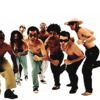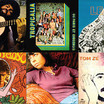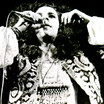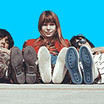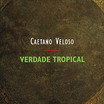Eubioticamente atraídos
tropicália:the search for health or the song of insanity?
Controversy
TROPICÁLIA:THE SEARCH FOR HEALTH OR THE SONG OF INSANITY?
Fausto Wolff
Tribuna da Imprensa, October 17, 1968
With my curiosity awakened by the commentaries of a few joumalists and the enthusiasm of some friends, I went Sunday night to Ricardo Amaral’s club, Sucata, to see the show of Caetano Veloso, Gilberto Gil, and Os Mutantes -two guys and a young woman who sing and play diverse instruments with a fabulous power of discovery of sounds and an impressive vocal sound. I saw a long-haired young man with a less refined voice but with a formidable power of interpretation and saturation à Ia Antonioni, only bettered by a North American who is part of the troup; and, finally, the three members of Os Mutantes wearing bizarre costumes. The group was conce$ived and created by a clever producer, Guilherme Araújo, who is well placed in the capitalist system and acts in concordance with the press. He organizes events that inevitably end up attracting the attention of newspapers, radio, and television. This system of self-promotion is like a well-oiled machine that works according to the laws of the game at the present moment. The audience, or rather, the public (and I know about cacophony) –comprised of the petty, middling, and elitebourgeoisie -is almost an aristocracy with the spending power for trips to the night-club and play a game that I would classify as “the game of perplexed ignorance.”
Of evething that I saw at the club, what seemed the most positive to me was the confirmation of chaos, of the ignorant anarchy in which we were involved. Very well. The chaos was captured and presented to the perplexed eyes of the bourgeoisie. But caos acted like penicillin. At first, it stuns the germs, but eventually fortifies them. The result: after a short time, the bourgeoisie, the primary target, digests (as it digests everything that doesn’t wound it economically) the aggression and receives it as a gift or a caress. Caetano Veloso made the bed and lay in it, and from now on, as long as the fashion endures, he has permission to do anything, including lying in bed on the middle of the stage and occasionally howling. The closest phenomenon to Veloso and his peers seems to me to be Hélio Oiticica in the arts, who, after gaining fame, sent a lamp to the Tokyo biennial.
But dialectically, what is guiding Tropicália? What comes after the statement of chaos, after making the audience accustomed to chaos? What is the synthesis of the antithesis? Even though I don’t uphold as Manichean a position as, for example, Augusto Boal, I am obliged to agree with him when he says that Tropicália “claims to destroy bad taste by promoting bad taste. It claims to criticize Chacrinha by participating in his musical TV shows […] It claims to épater but it merely succeeds in enchanter le bourgeois.” He ends by saying: “I will believe a little more in this movement when a Tropicalist will have the courage to do what Baudelaire (a poet who continues to speak to the men of our time in a universal language) did a century ago: dress up with his hair dyed green and walk around with colorful turtle tied with pink string.” I agree that creation needs more roam to develop, and, therefore, it is necessary to destroy conventions. But these conventions are destroyed through ethical slaps and not by tickling under the armpits of the bourgeoisie with a little feather.
It seems to me that any expression of art, in order to be valid, needs, in its essence, to contain a revolutionary character that mar not be ethical but that must, at the very least, be dynamic. I respect the Tropicalists in that they attempt, with their destructive fury, to emancipate themselves from the ties of blood, soil, father, mother, loyalty to the state, class, race, party, and religion; they reveal that ideologies act as a façade for undesirable realities; and they say “no” to the status quo. But a “no” requires a “yes” to genuine principIes, and this “yes” is lacking in Tropicalism. Revolutionary is the sane man in an insane world. The sane man, the revolutionary, attempts to spread sanity, while the Tropicalists, despite their philosophers, limit themselves to interpreting the song of insanity (…) Artistically, it is an event, even an important afie, but politically, ifyou will, it is no more than a joke.
TROPICÁLIA:THE SEARCH FOR HEALTH OR THE SONG OF INSANITY?
Fausto Wolff
Tribuna da Imprensa, October 17, 1968
With my curiosity awakened by the commentaries of a few joumalists and the enthusiasm of some friends, I went Sunday night to Ricardo Amaral’s club, Sucata, to see the show of Caetano Veloso, Gilberto Gil, and Os Mutantes -two guys and a young woman who sing and play diverse instruments with a fabulous power of discovery of sounds and an impressive vocal sound. I saw a long-haired young man with a less refined voice but with a formidable power of interpretation and saturation à Ia Antonioni, only bettered by a North American who is part of the troup; and, finally, the three members of Os Mutantes wearing bizarre costumes. The group was conce$ived and created by a clever producer, Guilherme Araújo, who is well placed in the capitalist system and acts in concordance with the press. He organizes events that inevitably end up attracting the attention of newspapers, radio, and television. This system of self-promotion is like a well-oiled machine that works according to the laws of the game at the present moment. The audience, or rather, the public (and I know about cacophony) –comprised of the petty, middling, and elitebourgeoisie -is almost an aristocracy with the spending power for trips to the night-club and play a game that I would classify as “the game of perplexed ignorance.”
Of evething that I saw at the club, what seemed the most positive to me was the confirmation of chaos, of the ignorant anarchy in which we were involved. Very well. The chaos was captured and presented to the perplexed eyes of the bourgeoisie. But caos acted like penicillin. At first, it stuns the germs, but eventually fortifies them. The result: after a short time, the bourgeoisie, the primary target, digests (as it digests everything that doesn’t wound it economically) the aggression and receives it as a gift or a caress. Caetano Veloso made the bed and lay in it, and from now on, as long as the fashion endures, he has permission to do anything, including lying in bed on the middle of the stage and occasionally howling. The closest phenomenon to Veloso and his peers seems to me to be Hélio Oiticica in the arts, who, after gaining fame, sent a lamp to the Tokyo biennial.
But dialectically, what is guiding Tropicália? What comes after the statement of chaos, after making the audience accustomed to chaos? What is the synthesis of the antithesis? Even though I don’t uphold as Manichean a position as, for example, Augusto Boal, I am obliged to agree with him when he says that Tropicália “claims to destroy bad taste by promoting bad taste. It claims to criticize Chacrinha by participating in his musical TV shows […] It claims to épater but it merely succeeds in enchanter le bourgeois.” He ends by saying: “I will believe a little more in this movement when a Tropicalist will have the courage to do what Baudelaire (a poet who continues to speak to the men of our time in a universal language) did a century ago: dress up with his hair dyed green and walk around with colorful turtle tied with pink string.” I agree that creation needs more roam to develop, and, therefore, it is necessary to destroy conventions. But these conventions are destroyed through ethical slaps and not by tickling under the armpits of the bourgeoisie with a little feather.
It seems to me that any expression of art, in order to be valid, needs, in its essence, to contain a revolutionary character that mar not be ethical but that must, at the very least, be dynamic. I respect the Tropicalists in that they attempt, with their destructive fury, to emancipate themselves from the ties of blood, soil, father, mother, loyalty to the state, class, race, party, and religion; they reveal that ideologies act as a façade for undesirable realities; and they say “no” to the status quo. But a “no” requires a “yes” to genuine principIes, and this “yes” is lacking in Tropicalism. Revolutionary is the sane man in an insane world. The sane man, the revolutionary, attempts to spread sanity, while the Tropicalists, despite their philosophers, limit themselves to interpreting the song of insanity (…) Artistically, it is an event, even an important afie, but politically, ifyou will, it is no more than a joke.












